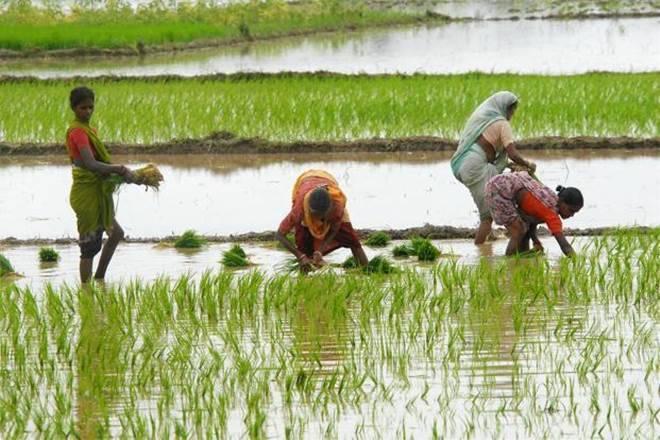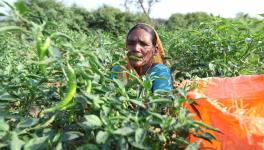Kerala to Strengthen Farmers’ Collectives to Counter ‘Corporate-Friendly Farm Reforms’

Image Courtesy: PTI
Shortly after the Rajya Sabha passed two of the three farm Bills with a voice vote on Sunday, farmers across the country have intensified their protests pointing out that that the proposed ‘reforms’ would serve the interests of corporates, not of farmers.
As the Narendra Modi-led Bharatiya Janata Party gets ready to open up agricultural trade to corporates, the Kerala government has come out with an alternative system that seeks to serve the interests of the faring community.
Kerala Agriculture Minister VS Sunil Kumar on Sunday said the state government would implement an alternative system to fight the corporates through cooperative societies. This was because , being a consumer state, the new ‘reforms’ being pushed by the Centre would deal a heavy blow to Kerala, he added
“Farmers are starving across the country. We have seen how export policies have driven farmers to suicide earlier. The Central government has moved to the next phase of this reform without having any mercy (on farmers). Even the few remaining measures of security in agriculture will be taken away with this (farm Bills),” said Kumar.
“The central government is keeping quiet about the Swaminathan Commission, which had been appointed for protecting farmers. If these Bills are intended for the welfare of farmers, the government should first legislate the laws suggested by the Swaminathan panel report”, the minister added.
Read more: Why Are Farmers Opposing the Farm Bills?
In July 2019, when Union Agriculture Minister Narendra Singh Tomar hinted at the Centre’s plan to accelerate contract farming in the name of advanced technologies and more productivity in the agrarian sector, Kerala had opposed the plan.
Back then, Kumar made it clear that the Kerala government won’t follow the contract farming model that gives direct access to corporates into the farmland. Instead, the state would promote collective farming which is done by various co-operatives and community networks, like Kudumbashree.
“The Left Democratic Front (LDF) government in Kerala has strong political dissent over the Centre’s contract farming policy that helps corporates. Clearly, contract farming aims to promote corporate feudalism,” he had said.
As per the new ‘reforms’, Ashok Dhawale, president of All India Kisan Sabha (AIKS) had pointed out earlier that “farmers who incur losses in farming, will be forced to hand over their land to corporates for farming”.
However, as per the proposed alternative model to contract farming, Kerala aims to promote agricultural cooperative societies and community networks, like Kudumbashree, which are involved in collective farming. Collective farming is based on social ownership of means of production and collective labour.
The state has successful models of cooperative societies that help local farmers get fair prices for their agricultural produce. The Brahmagiri Development Society (BDS) in Wayanad district is an example. The hilly district’s main crops, such as pepper, coffee and cardamom, had faced a crash in prices due to trade liberalisation. This crash in prices of agricultural produce had resulted in the suicides by hundreds of farmers in the region. The situation had led to the formation of the BDS. Since 2000, this cooperative society has been collaborating with local panchayats. At present more than 13,500 families are the part of cooperative’s initiatives.
If we come to Kudumbashree, a poverty eradication and women empowerment programme implemented by the State Poverty Eradication Mission (SPEM) in 1997, it has also been involving in collective farming.
Read more: How Kerala’s Cooperative Model is Making Strides Despite Odds
Since 2004, Kudumbashree had entered into the field of agriculture within the framework of Community Based Organisation. The Community Development Societies (CDS) and Area Development Societies (ADS) mobilise women farmers for lease land farming from Neighbourhood Groups (NHGs), which are grassroot-level organisations .Most of these women farmers are landless or have only marginal lands and take fallow land on lease.
“Assistance was sanctioned only when commercial cultivation is undertaken, i.e., individuals cultivating more than 0.1 hectare and groups cultivating more than 0.8 hectare were considered as commercial cultivators. For those groups who followed organic farming, an additional 50 % of the incentive is provided when certification from agriculture office was received. Efforts were also taken for convergence of lease land programme with various departments like Local Self Government and Agriculture,” reads a report from Kudumbashree Mission, which has been one of the success stories of the Kerala government.
Get the latest reports & analysis with people's perspective on Protests, movements & deep analytical videos, discussions of the current affairs in your Telegram app. Subscribe to NewsClick's Telegram channel & get Real-Time updates on stories, as they get published on our website.
























